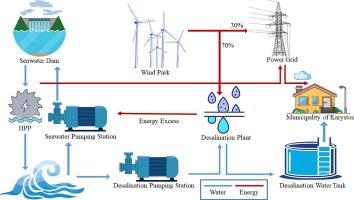A Methodological Framework for the development of a hybrid renewable energy system with seawater Pumped storage Hydropower system under uncertainty in Karystos, Greece
IF 7.1
2区 工程技术
Q1 ENERGY & FUELS
Sustainable Energy Technologies and Assessments
Pub Date : 2024-09-28
DOI:10.1016/j.seta.2024.104002
引用次数: 0
Abstract
The need to minimize energy reliance and its repercussions and accretive water scarcity necessitates research into renewable energy resources. Hybrid renewable energy systems are an apparent solution for areas and countries like Greece, especially when combined with seawater-pumped storage hydropower systems, where wind potential and topography foster such approaches. Moreover, it is essential to understand the uncertainty of the involved natural processes and incorporate their stochasticity in these hybrid systems, moving towards a more realistic approach. This system is simulated under uncertainty and has a total capacity of 31.5 MW and aims to cover the water and energy needs of Karystos, combining 9 wind turbines of 3.5 MW each, a desalination plant of 9,600 m3/day, a desalinated water tank with a capacity of 100,000 m3, a 9 MW pumping station, and a seawater pumped storage hydropower system with a 1.7 hm3 storage tank. Some promising results of this system under study are 99 % reliability for drinking water needs and 63 % and 85 % for irrigation and energy needs respectively, with the wind park contributing 54.4 % and the hydropower system 31.3 %.

希腊卡里斯托斯不确定情况下开发海水抽水蓄能水电混合可再生能源系统的方法框架
由于需要最大限度地减少对能源的依赖及其造成的影响,以及水资源的日益匮乏,因此有必要对可再生能源进行研究。对于像希腊这样的地区和国家来说,混合可再生能源系统显然是一种解决方案,尤其是与海水抽水蓄能水力发电系统相结合时,因为希腊的风能潜力和地形有利于采用这种方法。此外,有必要了解相关自然过程的不确定性,并将其随机性纳入这些混合系统中,从而采用更加现实的方法。该系统是在不确定性条件下模拟的,总容量为 31.5 兆瓦,旨在满足卡里斯托斯的水和能源需求,由 9 台各 3.5 兆瓦的风力涡轮机、一个每天 9,600 立方米的海水淡化厂、一个容量为 100,000 立方米的淡化水箱、一个 9 兆瓦的泵站和一个容量为 1.7 立方米的海水抽水蓄能水电系统组成。研究中的这一系统的一些可喜成果是,饮用水需求的可靠性为 99%,灌溉和能源需求的可靠性分别为 63% 和 85%,其中风力园的贡献率为 54.4%,水力发电系统的贡献率为 31.3%。
本文章由计算机程序翻译,如有差异,请以英文原文为准。
求助全文
约1分钟内获得全文
求助全文
来源期刊

Sustainable Energy Technologies and Assessments
Energy-Renewable Energy, Sustainability and the Environment
CiteScore
12.70
自引率
12.50%
发文量
1091
期刊介绍:
Encouraging a transition to a sustainable energy future is imperative for our world. Technologies that enable this shift in various sectors like transportation, heating, and power systems are of utmost importance. Sustainable Energy Technologies and Assessments welcomes papers focusing on a range of aspects and levels of technological advancements in energy generation and utilization. The aim is to reduce the negative environmental impact associated with energy production and consumption, spanning from laboratory experiments to real-world applications in the commercial sector.
 求助内容:
求助内容: 应助结果提醒方式:
应助结果提醒方式:


